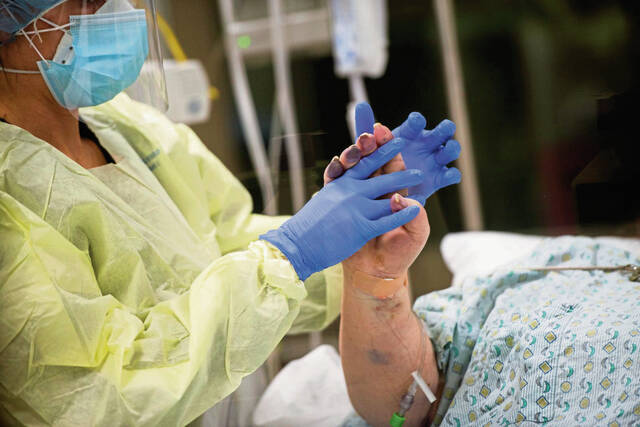In response to the emergence of the covid-19 pandemic in March 2020, Gov. Tom Wolf enacted numerous waivers for unnecessary regulations to ensure Pennsylvanians had access to health care. These were extended several times, but they are once again set to expire. Sadly, many Pennsylvanians lacked access to health care before the pandemic. Instead of ending these regulatory waivers, we should make them permanent, so that Pennsylvanians have access to the care they need.
The waivers for out-of-state or temporary licenses were first issued March 26, 2020, as part of a declaration of disaster emergency. These waivers cover dozens of medical professions, making it easier for Pennsylvanians to provide healthcare and for out-of-state health care workers to move here from another state.
Wolf extended many of the licensing waivers several times during the pandemic. Last June, the Legislature ended the state of emergency, which prevented him from using the emergency to extend these waivers.
The licensing waivers remove red tape for a range of professionals. They help out-of-state health care practitioners practice in Pennsylvania, increase the number of institutions with which medical doctors can be affiliated, expand scope of practice for physician assistants (PAs), certificated registered nurse practitioners (CRNPs), licensed respiratory therapists and pharmacists, allow more professions to administer covid-19 vaccinations, and ease many more regulatory requirements. In practice, they made it easier for Pennsylvanians to receive the health care they need.
The multiple extensions of the licensing waivers helped support Pennsylvania hospitals and patients. However, ending them now leaves hospitals in a difficult spot. While future waves of covid-19 should be much less pronounced, winter surges combined with the flu season will likely put pressure on hospital capacity — which was already below our needs. Despite their experience, Pennsylvania’s health care workers now must return to their pre-pandemic roles as the waivers expire. Health care workers from New Jersey and West Virginia will have a difficult time continuing or starting work in Pennsylvania as the government reinstates the previous barriers to interstate practice.
If these licensing regulations are harmful enough that we need to suspend them to ensure adequate access to health care during the pandemic, we should reconsider if we need them at all. Pennsylvania, like the rest of the United States, is suffering from a shortage of health care professionals. Many parts of the state are officially designated health care shortage areas, where patients have difficulty finding care.
There are other lessons we can learn. Recently, Pennsylvania joined the Nurse Licensure Compact (NLC), which makes it easier for nurses to practice across state lines and move to a new state to work without being slowed by unnecessary red tape. Pennsylvania passed a bill to join the Interstate Medical Licensing Compact (IMLC) in 2015, which would allow the same for physicians. However, the state has yet to implement the compact, so Pennsylvanians have yet to see the benefits. Additionally, Pennsylvania should consider joining the APRN interstate compact, which makes interstate practice easier for highly skilled nurses.
But not all health care professions have licensing compacts. Pennsylvania currently has a weak form of universal recognition, which accepts licenses that the board determines are similar. Strengthening universal recognition to accept fully licensed professionals from all other states would make it easier for all professionals to relocate to Pennsylvania and practice, without long delays caused by red tape. Universal recognition of licenses from other states is becoming increasingly common, with 18 states having enacted this reform so far.
Although universal recognition and compacts are not a substitute for removing or reducing unnecessary licensing barriers, they allow workers to take their license with them to work in new states or across state lines. The covid-19 pandemic has shown the value of letting skilled health care professionals move here to work. We should continue to find ways to make that easier. Making the licensing waivers permanent and strengthening our licensing recognition of licenses from other states would do just that.
We should not be throwing up roadblocks for trained professionals who want to come to Pennsylvania to practice, and especially not when health care capacity is limited.
The time to act is now. Pennsylvania can help hospitals, patients and its workforce in a single move by making licensing waivers of unnecessary regulations permanent. Ensuring that patients have access to care is essential, and making these temporary waivers permanent can do just that.
Darwyyn Deyo is a research affiliate and Conor Norris is the assistant director at the Knee Center for the Study of Occupational Regulation at West Virginia University. Deyo is also an assistant professor of economics at San José State University and a senior research fellow at the Institute for Justice.








